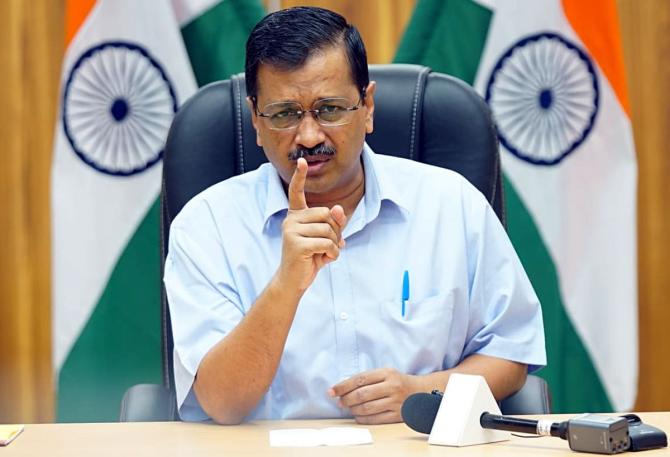 | « Back to article | Print this article |
A Chief Minister's promise to citizens is clearly “enforceable”, the Delhi high court ruled on Thursday while directing the Aam Aadmi Party government to decide on Arvind Kejriwal's announcement that if a poor tenant was unable to pay rent during the COVID-19 pandemic, the state would pay it.

The high court said the decision, which has to be taken within six weeks, would keep in mind the larger interest of the people for whom the benefit was intended as per Delhi Chief Minister's statement and thereafter, the AAP government would frame a clear policy in this regard.
Justice Prathiba M Singh said that against the backdrop of the commitment made, it is not the positive decision making which is arbitrary, but the lack of decision making or indecision which this court holds to be contrary to law.
Once the Chief Minister had given a solemn assurance, a duty was cast on the Delhi government to take a stand as to whether to enforce the promise or not, the court said.
The promise was to act as a balm on the wounds of landlords and tenants, who were severely affected as a class of citizens in Delhi, it said, adding that it was not clear why the government chose to completely disregard the promise made by its CM and not effectuate it.
“A statement given in a consciously held press conference, in the background of the lockdown announced due to the pandemic and the mass exodus of migrant labourers, cannot be simply overlooked. Proper governance requires the government to take a decision on the assurance given by the CM, and inaction on the same cannot be the answer,” the court said in its 89-page verdict.
On this “indecision”, the government needs to answer the question but it has failed to do so, it said.
The verdict came on a petition by daily wagers and workers seeking to enforce the promise made by Kejriwal on March 29 last year that if any tenant was unable to pay the rent due to poverty, the government would pay his or her rent on their behalf.
The petitioners claimed to be tenants who were unable to pay monthly rent, and a landlord who has not been able to receive the rent from his tenant. They all sought recovery or payment of the monthly rent, as per the Chief Minister's promise.
They said Kejriwal held a press conference on March 29, 2020, in the wake of the COVID-19 pandemic, in which he requested all landlords to postpone the demand of rent from those tenants who were poor and poverty stricken.
The court said, “The promise/ assurance/ representation given by the CM clearly amounts to an enforceable promise, the implementation of which ought to be considered by the government. Good governance requires that promises made to citizens, by those who govern, are not broken without valid and justifiable reasons.”
It said the saying ‘promises are meant to be broken' is well known in the social context, however, law has evolved the doctrines of legitimate expectation and "promissory estoppel" to ensure that promises made by the government, its officials and other authorities are not broken and are judicially enforceable, subject to certain conditions.
Justice Singh said inaction would not be permissible when clearly the promise or assurance made by the CM is not in doubt and admitted by the government.
“In a democratic setup, persons who hold an elected office and especially heads of government, heads of State and those holding responsible positions are expected to make responsible assurances to their citizens, especially in times of crisis and distress,” the court said.
The court said there would be a reasonable expectation of citizens that an assurance made by a constitutional functionary, not less than the CM himself, would be give effect to and it cannot be said that no tenant or landlord would have believed him.
It said the nature of rights are of greater importance as they relate to ‘Right to Shelter' during a pandemic and in the context of upholding fundamental rights, the principles of legitimate expectation have to be accorded a higher pedestal and the burden on the authority concerned not to honour the same, is even higher.
It said the assurance was not a “political promise”, as was sought to be canvassed as it was not made as a part of an election rally but it was the statement made by the Delhi Chief Minister.
“There is a reasonable expectation on behalf of the citizens that the CM knows the background, in which such a promise is being made, the number of people who would be affected by the same as also the financial implications of such a promise/assurance, in the context in which it was made.
“The statement was not made by a government functionary at a lower level in the hierarchy, who could be devoid of such knowledge. The CM is expected to have had the said knowledge and is expected to exercise his authority to give effect to his promise/assurance,” it said, adding that a citizen would believe that the CM has spoken on behalf of his government, while making the promise.
The court refused to accept the submission of Delhi government that all governmental policies are executed in the name of the Governor and any statement made by the CM would not be enforceable in law.
It cannot be said that merely because of the fact that the conduct of the business of the government has to be in the name of the Governor, the CM can be shorn of all the responsibilities, the court said.